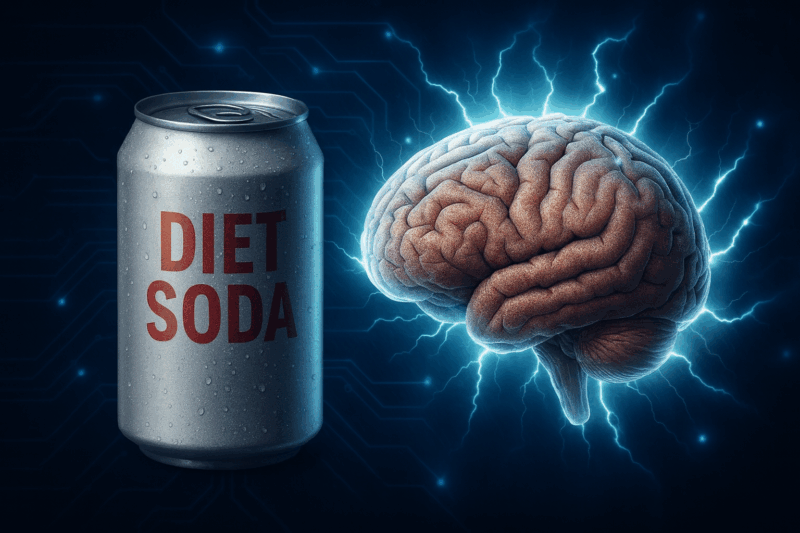A new study published in the journal Neurology suggests that drinking diet soda every day may speed up brain aging. Researchers followed 12,772 adults in Brazil for eight years. They found that people who consumed the most artificial sweeteners had a much faster decline in memory and thinking skills. The results were striking. Heavy users showed a 62 percent faster decline. That decline equaled about 1.6 extra years of brain aging.
The study looked at several popular sweeteners. These included aspartame, saccharin, acesulfame-K, erythritol, xylitol, and sorbitol. Tagatose was the only one that did not show harm. All the others were linked to measurable cognitive decline.
New Study Published in @GreenJournal: Some sugar substitutes linked to faster cognitive decline. https://t.co/XcZJVtIGHC#AANscience #BrainHealth pic.twitter.com/FWCdtJg0es
— American Academy of Neurology (@AANmember) September 4, 2025
Midlife Habits Matter
The findings showed the strongest impact in adults under 60. People with diabetes were also more vulnerable. Older adults over 60 showed no major difference, but the researchers warned that habits in midlife set the stage for brain health later on. Cognitive decline often begins decades before symptoms appear. A loss of 1.6 years of brain function may not sound dramatic, but across a population it is significant.
This makes diet choices in middle age especially important. People often believe switching to diet soda protects their health. The research shows the story may be more complicated. Artificial sweeteners may reduce sugar intake, but they could come with hidden risks. (RELATED NEWS: SNAP Soda Ban: Ending Taxpayer Junk Food Subsidies)
What the Experts Say
Claudia Kimie Suemoto, the study author and a neurologist at the University of São Paulo, explained that people often see artificial sweeteners as harmless. She said the results suggest they may not be harmless, especially with frequent use in midlife:
“Low- and no-calorie sweeteners are often seen as a healthy alternative to sugar, however our findings suggest certain sweeteners may have negative effects on brain health over time,”
Other physicians note that reducing sugar can still help some people. But they also encourage natural alternatives when possible.
Not everyone agrees on the interpretation. Industry groups argue that these sweeteners remain safe. They point out that all of the common sweeteners studied are approved by the Food and Drug Administration.
The Trump Administration’s Warning
However, the Trump Administration’s “Make Our Children Healthy Again” Assessment, released in May 2025 by the Make America Healthy Again Commission, directly addressed these additives. The commission, chaired by HHS Secretary Robert F. Kennedy, Jr., stated:
“Artificial sweeteners like aspartame, sucralose, and saccharin, used widely in diet sodas and sugar-free foods, have been observed to interfere with the gut microbiome in some studies. Gut microbiome shifts have been linked to obesity, metabolic issues, and possibly glucose intolerance. The classification of aspartame as possibly carcinogenic (Group 2B) by the International Agency for Research on Cancer (IARC) further complicates the understanding of these widely used substances, especially given the existence of conflicting research results.”
Kennedy has made it clear that he is on a mission to bring these risks to light. His push is not just about raising awareness but about eliminating harmful additives from the American diet altogether. By targeting products that undermine metabolic and brain health, RFK Jr. has positioned this fight as central to protecting the next generation.
Why This Matters
The debate highlights a bigger question. What is the real cost of relying on artificial substitutes? Diet sodas and low-calorie snacks are everywhere. People turn to them to manage weight or blood sugar. Yet brain health may be part of the tradeoff. Studies like this raise awareness about long-term risks. They also remind us that brain aging is not just a concern for seniors.
For people in their 40s and 50s, the choices made today may shape how sharp the mind feels at 70 or 80. The study adds to a growing body of evidence that diet and lifestyle strongly affect the brain.
What You Can Do
Experts recommend moderation above all. Cutting back on artificial sweeteners can lower risk. Reading labels helps, since many “monk fruit” or “stevia” products are mixed with other sweeteners like erythritol. Choosing whole foods, fruits, and naturally sweetened items offers a safer path.
Exercise also plays a key role. Physical activity helps the brain produce protective proteins and supports memory. Good, healthy habits form a stronger shield for long-term health. (RELATED NEWS: Tracy Beanz Reveals MAHA’s Mission & What Comes Next In Fascinating Interview)
The Bigger Picture
Artificial sweeteners have already faced criticism. Some past research connected them to gut health problems and metabolic changes. Others raised questions about possible links to strokes or heart issues. While the science is not settled, the pattern is clear. When used in excess, these substitutes may not deliver the safe solution people expect.
None of this means sugar is healthy. High sugar intake is a proven risk factor for diabetes, obesity, and heart disease. The challenge is replacing sugar. That leaves many people searching for better alternatives. Small amounts of honey, maple syrup, or fruit can satisfy a sweet craving without the same risks.
A Wake-Up Call for Consumers
The study’s authors stressed that their results show association, not cause. Still, the message is clear enough for everyday life. If you drink diet soda daily, it may be time to cut back. Brain health is precious, and the habits you build now may protect you later.
This is not a call to panic. It is a reminder to stay alert and informed. Labels and marketing often sell artificial sweeteners as a free pass. Science now suggests the pass may come with hidden costs.
The best steps are simple. Limit sweeteners, eat healthy foods, and stay active. Your brain depends on it.
Cut through the noise. Drown out the spin. Deliver the truth.
At The Modern Memo, we’re not here to soften the blow — we’re here to land it. The media plays defense for the powerful. We don’t.
If you’re done with censorship, half-truths, and gaslighting headlines, pass this on. Expose the stories they bury.
This isn’t just news — it’s a fight for reality. And it doesn’t work without you.


